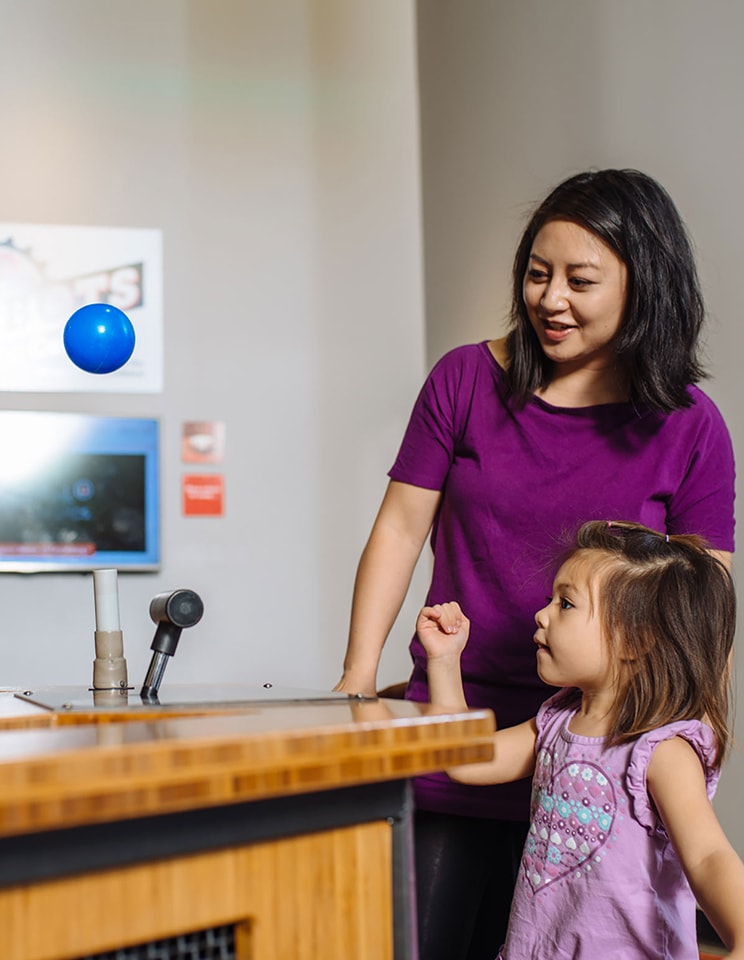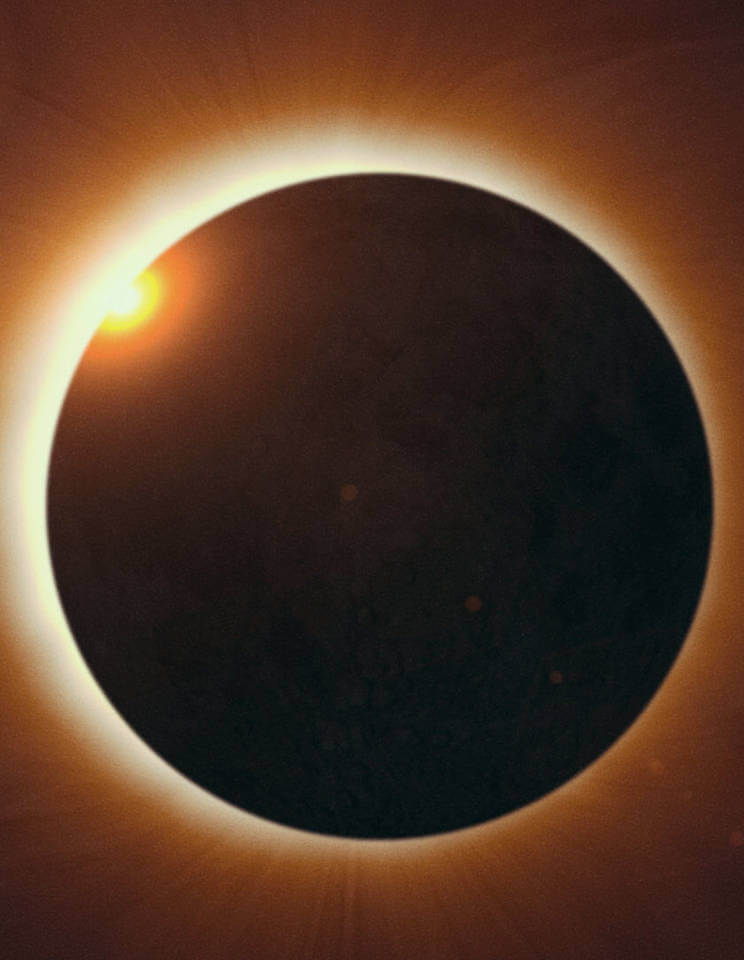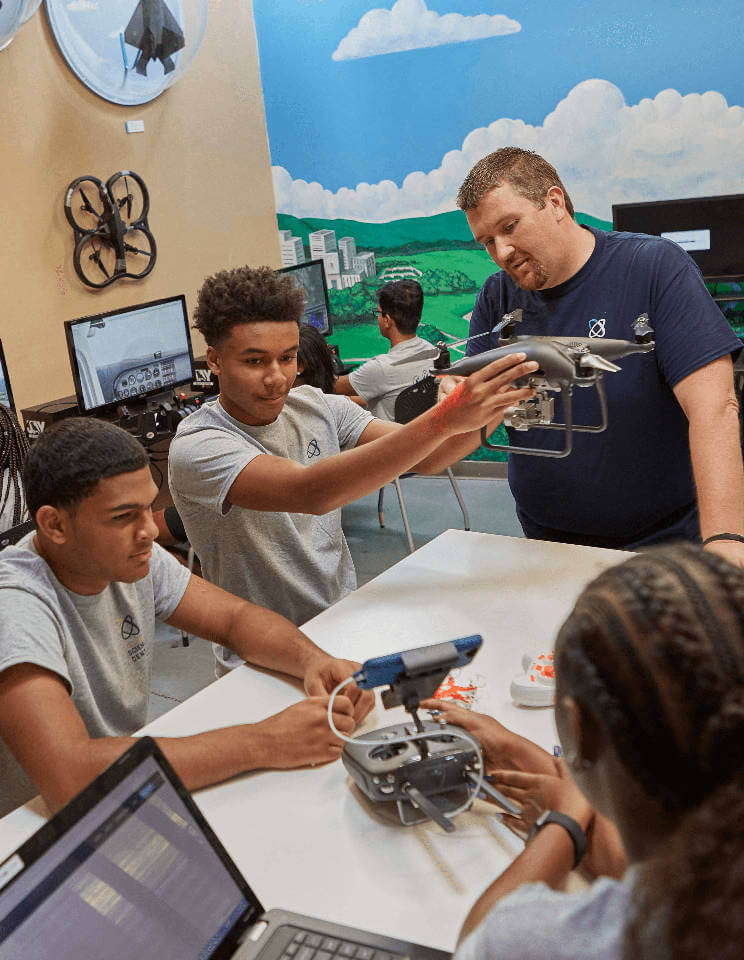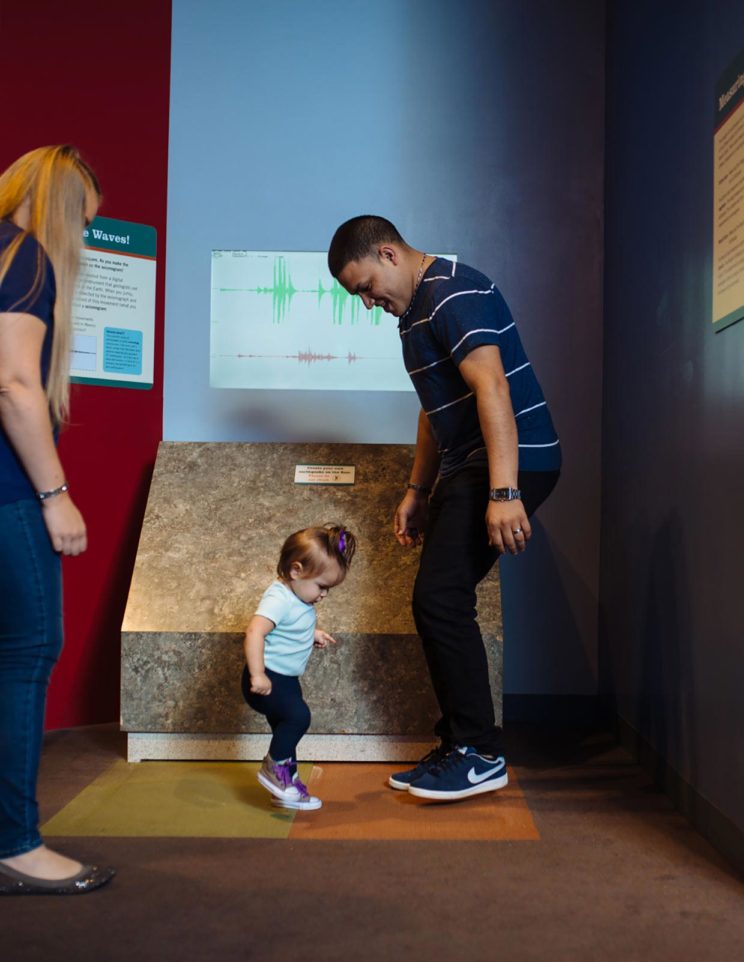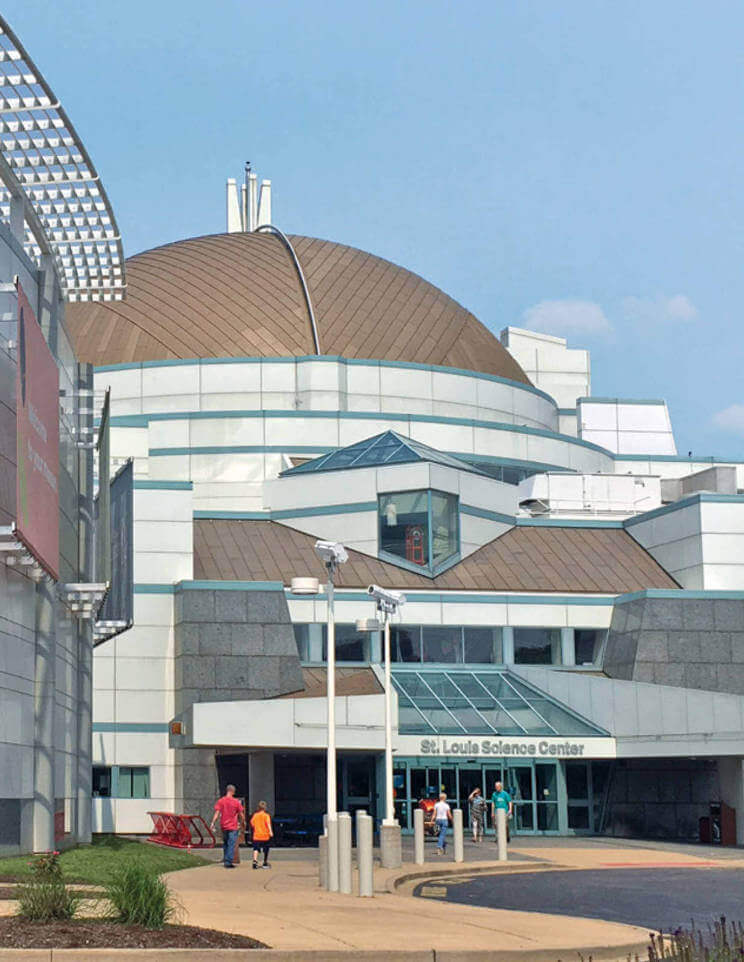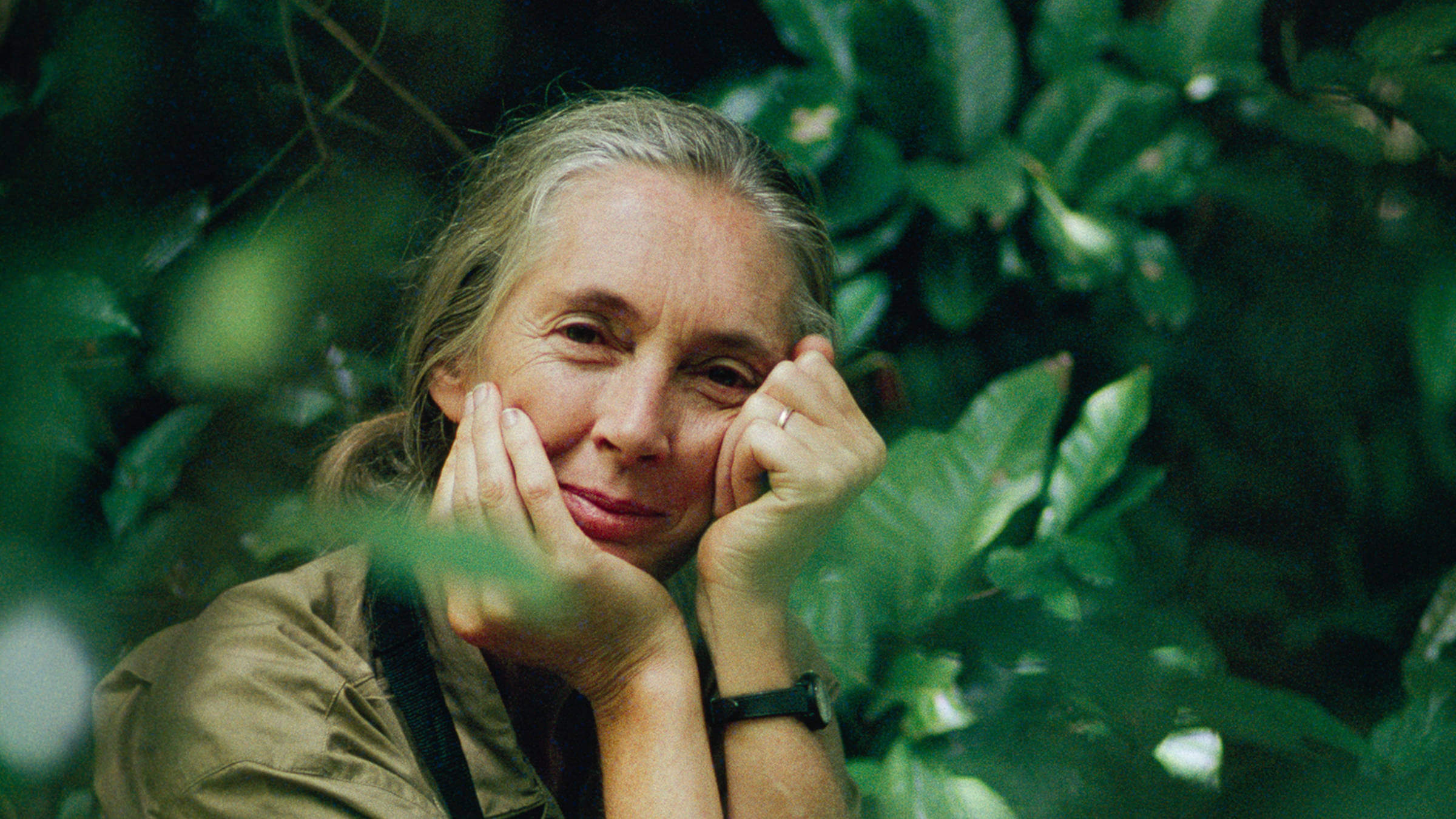

Discovery Room and Preschool Science Series Relaunch to Much Fun-Fare
 The reopening of the Discovery Room in June was an absolute success! The first week of access to the Discovery Room was limited to members and member kids only, and did they ever show up and shower praise upon the early childhood team! The Discovery Room’s newly enhanced offerings are designed especially for kids ages 6 months to 6 years old to help them discover STEAM concepts and play in a self-guided setting.
The reopening of the Discovery Room in June was an absolute success! The first week of access to the Discovery Room was limited to members and member kids only, and did they ever show up and shower praise upon the early childhood team! The Discovery Room’s newly enhanced offerings are designed especially for kids ages 6 months to 6 years old to help them discover STEAM concepts and play in a self-guided setting.
The hour-long Discovery Room sessions are ticketed, but free for members, and members can make their reservations over the phone or at the membership desk in the lobby.
After a long, fun summer of science discovery, Early Childhood Manager Emily Lemonds tells us she is very excited to kick off the fall programs!
Visit slsc.org/discovery-room to learn more about the program and its most current schedule.
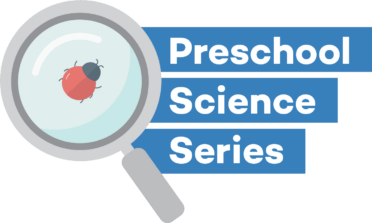 Preschool Science Series replaced the Discover Science with Me program and kicked off this past May. The 45-minute sessions, designed to engage children ages 3 to 6, take place in the Learning Lab, just outside the Life Science Lab on the first floor. These ticketed, educator-led sessions are held on weekends only and provide opportunities for children and their caregivers to wonder, play and discover together.
Preschool Science Series replaced the Discover Science with Me program and kicked off this past May. The 45-minute sessions, designed to engage children ages 3 to 6, take place in the Learning Lab, just outside the Life Science Lab on the first floor. These ticketed, educator-led sessions are held on weekends only and provide opportunities for children and their caregivers to wonder, play and discover together.
Topics in our fall sessions include dinosaurs, reptiles and amphibians, art, coding, physics, sensory play and more – all tailored to capture the imaginations of our littlest scientists.
Learn more about this program at slsc.org/preschool-science-series/.

Starlight,
Shine Bright
Before St. Louis’ iconic McDonnell Planetarium celebrates its 60th anniversary in 2023, a smaller annual event is about to take place this fall when the Planetarium’s ZEISS UNIVERSARIUM Mark IX Star Projector undergoes its annual maintenance from September 19–23.
Connecting people with the stars is no small matter for Will Snyder, manager of the McDonnell Planetarium, and the educators who guide guests through each show. In 2021, in spite of reduced capacity caused by the COVID-19 pandemic, more than 50,000 guests experienced a live star show in the Planetarium. Since the projector’s installation in 2001, millions of guests have been inspired to look up.
So, taking a week away from sparking audiences’ curiosity about the cosmos isn’t something the team takes lightly.
The projector is the technological marvel powering those experiences, using a complex system of intricate glass lenses and motors rather than digital projection, allowing the Zeiss to more accurately project over 9,100 individual stars and other celestial objects. Custom-built in Germany by Carl Zeiss Jena, the famed optics company, the projector is one of only three in the U.S. and 13 in the world. When combined with the McDonnell Planetarium’s 80-foot theater dome, the projector is able to create the largest artificial sky in the western hemisphere. Maintaining the four-ton projector combines the talents of both the Science Center team and a Zeiss technician from Germany who’s been servicing the Planetarium’s star projectors for over a decade.
Each fall, the Planetarium shuts down for a week to allow the Planetarium team and visiting technicians from Germany to give this mechanical marvel an annual tune-up, helping ensure the stars continue shining bright for both returning audiences as well as new ones.
This annual shutdown also enables the team to perform various upgrades that keep the projector equivalent to one fresh off the assembly line. Notable improvements have included retrofitting the original light engine with high-power and energy efficient LEDs; upgrading the Milky Way projection with new slides utilizing the latest GAIA map of our galaxy; and replacing the projector’s original axis motors to help ensure both the machine’s silent operation and its longevity.
To Snyder, ultimately the star projector is an instrumental part of ensuring that the Planetarium can serve as a gateway to the stars for the St. Louis community. For many guests, he points out, the Planetarium is the only way to experience the night sky unobscured by light pollution. “We’re stewards of this incredible piece of technology,” Snyder says, “so that we can provide these impactful experiences for people.”
The McDonnell Planetarium’s ZEISS UNIVERSARIUM Mark IX Star Projector will undergo its annual maintenance September 19–23. Star shows will resume on September 24.
 Meet The Team
Meet The Team

Je’Nai Burns
GUEST SERVICES REPRESENTATIVE

WOMEN IN SCIENCE
Q: Tell us a bit about your new role at the Science Center.
A: My current role is in Guest Services as a guest service representative, and I do many things. I help out in the parking lot, work as a greeter at the main entrance, sell tickets at the box office, make reservations in the reservation office and just make sure that everyone who comes in the building knows what’s going on.
Q: What made you want to come back to the Science Center after the YES Program?
A: Coming from the YES Program, I came from a family. I loved being there and enjoyed stepping foot into that building every day. There was never a dull or boring moment. Coming from that made me want to go to the Science Center’s Oakland Building, thinking it would be the same, and I was not let down—it’s an amazing experience to be here.
Q: When did you graduate from YES, and how has the program helped prepare you for this role?
A: I graduated in 2021. With the amount of public speaking I had to do in the YES Program, it really helped me learn to articulate my words and slow down.
Q: What’s your favorite part about the Science Center?
A: To most this may sound ironic but I absolutely love hearing all the kids laugh. Watching them come in, look up at the Energizer Ball Machine and just be amazed puts a smile on my face every time. I love walking around the building and seeing all the kids just so happy to learn and interact with so many things.
Chris Lau
GROW FACILITATOR
Q: What’s your current role here at the Science Center? Tell us a little about what you do.
A: I’m currently a GROW facilitator. My coworkers and I are responsible for everything happening in that outdoor space. When the crowds are smaller, you can find me watering plants or harvesting crops. When there’s a lot of activity, I’ll often post up by the chicken coop or beehive, talking to guests and answering questions.
Q: What made you want to come back to the Science Center after the YES Program?
A: The uniqueness of working at the Science Center was what made me so willing to come back. My last year with YES was spent interning with the team in GROW, and it’s a very dynamic job. To put it plainly, it’s fun. It’s fun going on explorations and finding creative workarounds to new problems.
Q: When did you graduate from YES? How has the program helped prepare you for this role?
A: I graduated from YES in May of 2021. The YES Program helped me develop soft skills and taught me how to interact with members of the community. I’m an engineering major, and a common saying in the industry is that the job isn’t just about being smart or knowing a lot, but you must also be able to communicate that knowledge in an effective and easy to understand way.
Whether it was teaching Summertime Science or being with the other teens, YES taught me how to communicate complex concepts in simple ways. Science can be daunting for some, so being able to be excited about it and communicate it well is a gift. Those skills aren’t just useful when interacting with the public here at the Science Center—they’re skills for life.
Q: What’s your favorite part about the Science Center?
A: I think my favorite part of the Science Center by far is the T-rex animatronic. When I first saw it as a kid, I was completely mortified and scared. But after being around it, watching it move and hearing my parents talk about it, I thought it was the absolute coolest thing ever. I’ve always had an interest in paleontology and fossils, and I attribute that to my first experience with the T-rex.
